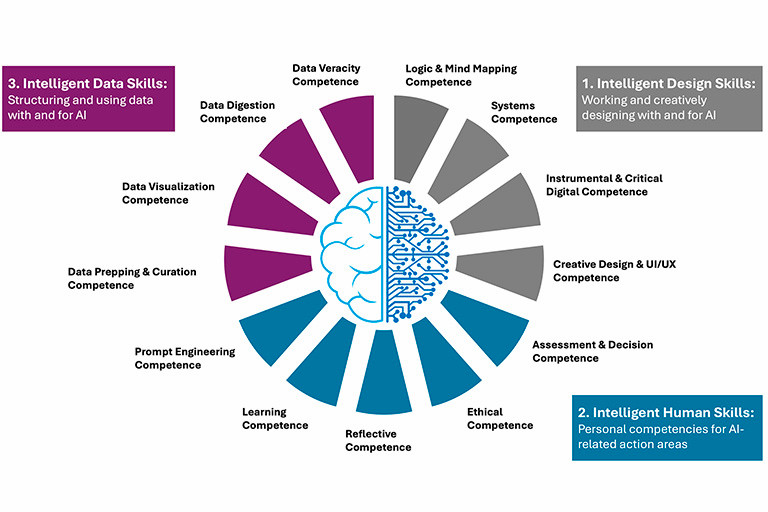Fawzi BenMessaoud recently published an EDUCAUSE Review article outlining a new model for integrating AI competencies into education—and "preparing students not just to adapt to inevitable changes but to lead the charge in shaping an AI-augmented world."

Fawzi BenMessaoud
Professor of Informatics
IU Indianapolis
Below is an excerpt about BenMessaoud's new model for a new reality:
The new reality that we all must come to terms with is that AI is now everywhere, it is here to stay, and it will be in everything as it is woven into the fabric of our daily lives. Our educational systems must pivot from preparing students for the world as it is to empowering them to succeed in the world as it will be with the rise of modern AI. I propose a tripartite model of competencies and skills integral to thriving in an AI-driven world: intelligent design skills, intelligent human skills, and intelligent data skills (see figure 1).

This framework advocates for a comprehensive educational paradigm shift, preparing individuals to navigate the complex interplay of human and AI interactions across various dimensions of society. It sets the stage for not only responding to the AI revolution but anticipating its trajectory, ensuring that the next generation is ready to harness AI's potential for the greater good. The competencies included in this model are not merely additive but should become the bedrock of education in a society where technology and humanity converge. They are the pillars upon which a new AI world is being built—a world in which education should not merely react to technological shifts but actively shape them.
BenMessaoud used this model to design his new "Introduction to AI" course, integrating intelligent design skills, human skills, and data skills both theoretically and practically. He also implemented an AI-powered virtual assistant named FazBot for the course, not merely as a generic tool from a GPT (generative pre-trained transformer) large language model, but as an educational agent. This agent is deeply embedded with BenMessaoud's tacit knowledge as a teacher—plus implicit/explicit knowledge about the course from Canvas, the library, and ancillary instructional resources and materials (including those offered by the school or as part of the program) making it safer than a GPT and a more focused instructional companion.
FazBot not only assists students with queries but also bridges the gap between human intuition and AI-driven responses, providing personalized support that adjusts based on learning preferences, course content, and pedagogical strategies. This combination of human-AI collaboration creates a learning environment where FazBot serves as both a teaching assistant and a student's constant academic companion, ensuring that learning is not just accessible but also adaptive and engaging.

